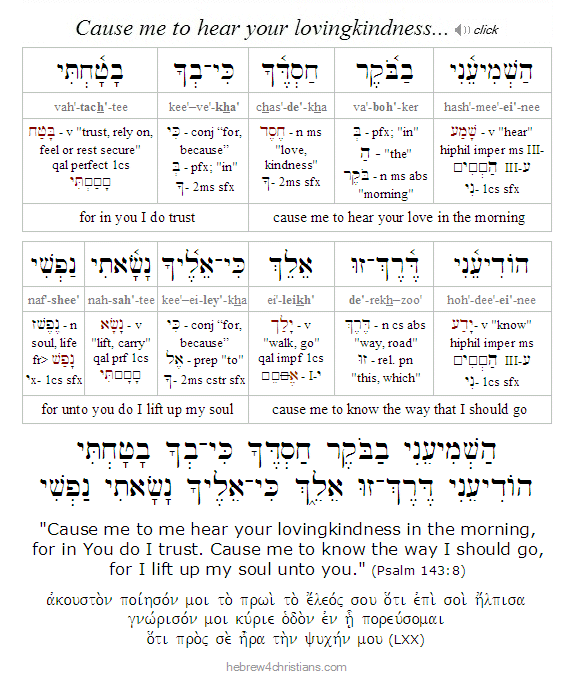|
In the Torah we discover a special verse that identifies the struggle we all have with sin in our lives. It appears early in the book of Genesis concerning God's appeal to Adam and Eve's firstborn son Cain, who was envious of his brother Abel. When Cain was upset that God had "looked upon" (i.e., accepted) Abel's offering of a lamb but had overlooked his own offering of fruit, he was angry and became "downcast." We then read: "So the LORD said to Cain, 'Why are you angry? and why is your face fallen? If you do well, will you not find acceptance? But if you do not do well, sin lurks at the door; its desire is for you, yet you must rule over it" (Gen. 4:6-7). Sadly Cain did not learn how to rule over the anger that lurked at the door of his heart, and later murdered his brother Abel...
God makes the same appeal to each of us: "Why are you so angry? Why are you downcast? If you do well, will you not find acceptance? But if you do not do well, sin lurks at the door; its desire is for you, yet you must rule over it." Amen, we say, but how are we to understand this admonition? How can we learn to overrule sin within our own hearts?
Let's think this through a bit. First of all we know that sin is doing what is contrary to God's will (1 John 3:4), and we also know that God has endowed the soul with a "conscience" that convicts us when we do something wrong (Rom. 2:15). When we realize that we have sinned we feel down, or have a "fallen face" (פָּנִים נָפלוֹת). When we feel ashamed if we do something wrong, we should understand that this painful feeling is meant to correct us and turn us back to the good.
The conscience is a great gift from heaven because it serves as an intuitive or inner guide that instructs us about what is right and what is wrong -- and how we should live our lives. Indeed, both the Hebrew word for "conscience" (i.e., matzpun: מַצְפוּן) and the word for "compass" (i.e., matzpen: מַצְפֵן) come the root idea of a hidden source of guidance (צפן) that will direct the way we should go. The Greek word for "conscience" used in the New Testament is "sun-eideisis" (συνείδησις), a word that means perceiving something in relation to a known standard of measurement, particularly knowing the rightness or wrongness of an action in light of God's moral law that is revealed within the heart (Rom. 2:15). Conscience is the awareness of moral truth; it is part of the image of God within us that is grounded in divine logic and reason. The Apostle Paul testified that he relied upon the "inner light" of conscience to guide his behavior: "And herein do I exercise myself, to have always a conscience void of offence toward God and toward men" (Acts 24:16). The conviction of the conscience bears witness to the spirit of truth (Rom. 9:1).
Conscience serves as an inner witness of the LORD God our Creator, who demands that we live as righteous people according to the direction (i.e., torah) of his moral authority. All people intuitively know they are morally accountable for what they do, but not everyone lives consciously before the divine Presence, in dialog with his or her conscience. Disregarding the voice of conscience is to disregard God, and conversely listening to its voice is to related to him. In this connection Kierkegaard said: "To have a conscience is to have a relationship in which you, as a single individual, relate yourself to yourself before God," by which he meant that our consciousness of moral reality, and our inner dialog within ourselves, is the mode by which we come to know ourselves before God.
When moral truth is suppressed or denied, however, or when conviction for sin is dismissed or ignored, a terrible thing begins to happen. The soul itself goes into exile and becomes deranged. If one good deed leads to another, so one sin leads to another, but a life of ongoing sin that is repeatedly denied or suppressed produces a spiritually lethal state wherein God may "give the soul over" to its godless desires and its chosen inner darkness. A "seared conscience" is one that is no longer able to detect the prompting of the inner voice of moral truth. Such a conscience is "cauterized" and made dead to the truth.
Tragically we see the effect of a seared conscience in our world every day. Hatred, rage, acts of murder; mass shootings, sexual perversion and violence, addictions, obsessions, and so on, are all prevalent in a godless world that has lost its ability to know what is right and what is wrong. The practice of sin is a life of insanity. The ongoing deception of political, educational, scientific, and other leaders inevitablly evokes divine judgment on cultures that scorn the need for godly virtue. It is hardheartedness and inner depravity that seeks to justify the extinguishment of shame at the price of honesty and truth... The Bible warns us of false teachers who are mouthpieces of evil, and the world system is filled with such teachers who suppress the truth for the violence of the lie. Think of the deceptive mass media and its systematic practice of disseminating lies... Since they implicity refuse the truth of God in their thinking," they are false teachers who deceive others.
Sin "lurks at the door" waiting for the heart to open to its lying seductions. In Jewish thinking, the inner urge to sin, what Christians sometimes call the carnal "sin nature," is personified as an alien force that desires access to your soul. This evil impulse to do what is wrong is called the "yetzer ha'ra" (יֵצֶר הַרַע), or the imagination of evil. The sages came up with the term as they discussed the phrase "the imagination of the heart of man [is] evil" (יֵצֶר לֵב הָאָדָם רַע) during Noah's generation (Gen. 6:5, Gen. 8:21). The phrase "yetzer lev" is a general term that refers to the imagination that inclines the will, whether to do good or to do bad. For instance, yetzer lev can refer to both the imaginative urge of a potter before he forms a vessel, and it can refer to the form of a graven image or idol. The Jewish concept of yetzer ha'ra is often thought to be a weakness of the soul that is liable to the urge to do something evil. This is similar to the Christian idea regarding our inherited "sin nature," or the indwelling desire to sin, that must be "mortified" by faith in God's deliverance.
In the New Testament, however, the struggle with evil goes beyond the Jewish idea of inner wrestling with the yezer ha'ara, for therein we learn that the devil (השטן) walks about as a roaring lion, seeking to "devour" human souls (1 Pet. 5:8), and this picture goes beyond the idea that evil is the result of fallen sinful nature alone. Recall that our verse reads: "sin lurks at the door; its desire is for you, yet you must rule over it," and this personification suggests that there exists an alien force that seeks access to the human heart in order to entice its sinful nature in contempt of God's moral law. "It's desire is for you" can also be read as "his desire is for you" (אֵלֶיךָ תְּשׁוּקָתוֹ), and that is what the devil does, after all: he "devours souls" -- he hungers for them to join him in his lost estate of perdition...
The Lord promises us victory over both our own inclination to sin as well as the outright temptations of the devil if we will sincerely yield to him: "Submit yourselves therefore to God. Resist the devil, and he will flee from you. Draw near to God, and he will draw near to you" (James 4:7-8). Put on the armor of God (Eph. 6:11-18). "No temptation has overtaken you that is not common to man, but God is faithful, who will not permit you to be tempted above what you are able to bear; but will with the temptation also make a way to escape (τὴν ἔκβασιν), that you may have strength (i.e., δύναμις) to endure it" (1 Cor. 10:13).
If a "seared conscience" is one that is unfeeling and dead to moral truth, a godly conscience is one that is tender, sensitized, and fully alive to moral reality. We can learn to heighten our awareness of moral truth by means of the study of Scripture, as it says "All Scripture is given by the breath of God (i.e.,θεόπνευστος) and is profitable for teaching, for conviction, for correction, and for instruction in righteousness" (2 Tim 3:16). Of course Yeshua is our Lord, our Master and our guide, and therefore we should study his words about the righteousness of the law, the rule of the kingdom, our duty to practice works of love, and so on. The traditional study of Jewish ethics, called "musar," can also provoke us think about how to live our lives as tzaddikim, or righteous people (Psalm 1:1-3).
The Hebrew word "chinukh" (חִנּוּךְ), "education," shares the same root as the word "chanukah" (חֲנֻכָּה), meaning "dedication." Unlike the Greek view that regards education as a pragmatic process of improving one's personal power or happiness, the Jewish idea implies dedication to God and the willingness to be partners with Him on the earth. Disciples of Yeshua are therefore called "talmidim" (תַּלְמִידִים) -- a word that comes from "lamad" (לָמַד) meaning "to learn" (the Hebrew word for teacher is "melamad" (מְלַמֵּד) from the same root). In the New Testament, the word "disciple" is μαθητής, a learner or a pupil of a διδάσκαλος, or a teacher. I mention all this because true education is foundational to being a disciple of the Messiah, and moral education is a large part of that education.
Let us go back to where we started: "If you do well, will you not find acceptance?" The Hebrew for "do well" here (i.e., yahtav: יָטַב) means to be glad or joyful, to have inner peace and confidence because our conscience attests that we are approved of God. We will then find "acceptance," or she'eit (שְׂאֵת), a word that comes from the verb "nasa" (נָשָׂא) meaning to be lifted up or elevated. When we honor God's truth, we will experience true self-acceptance because God himself will lift up our hearts. And that is the source of our power to withstand temptations of sin, namely knowing that God has accepted us and gives us his shalom. We turn to God and know Him as the "friend of sinners" who loves us with everlasting love and calls us to live in the truth of that love...
O precious Lord, "cause me to me hear your lovingkindness in the morning, for in You do I trust; cause me to know the way I should go, for I lift up my soul to you." Amen.
Hebrew Lesson
Psalm 143:8 Hebrew reading (click):
 |
<< Return
|



